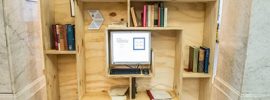Digital Creativity as Critical Material Thinking: The Disruptive Potential of Electronic Literature
This article has greatly benefited from the research group “Exocanónicos: márgenes y descentramiento en la literatura en español del siglo XXI” (PID2019-104957GA-I00), part of the Spanish Programa Estatal de Generación de Conocimiento y Fortalecimiento Científico y Tecnológico de I+D+i funded by the Ministerio de Ciencia, Innovación y Universidades. Creative Making as Critical Thinking: A New Framework for the Digital Humanities At the turn of the 21st century, literary critics like Johanna Drucker (2002), Jerome McGann (2001) or even digital poet Loss Pequeño Glazier (2002) wrote about the importance of “making things” as a way of doing theoretical work. The benefits of this have been widely discussed and affirmed since Drucker advanced that digital technologies could only be understood by praxis. In “Theory as Praxis: The poetics of Electronic Textuality,” she criticized the type of abstract approach embraced by postcolonial or structural studies at large, and explained that critiques of the foundations of textuality that were based on the terms of older philosophy were insufficient to deal with the new digital condition (Drucker 683). She turned to Jerome McGann’s Radiant Textuality to explain how poiesis, now conceptualized as theory, presented itself as the only valid means to capture the world’s new reality, after the digital revolution. Both McGann and Drucker understand poiesis in its literal Greek sense, as “building” or “construction” [i.e. “making”] in opposition to gnosis, as “conceptual undertaking.” “Making things as a way of doing theoretical work pushes the horizons of one’s understanding” (Drucker 684), she boldly asserted, and moved on to explain how this distinction between gnosis and poiesis was rarely considered in the Humanities, in part because participating in “hands-on” projects is not something humanists usually do. Almost two decades later, this essay still responds to the necessity of finding another way of approaching Humanities’ projects that situates “making” at the heart of its doing, focusing in particular on the creative elements within its gnosis. While this “making-as-theory” paradigm could be applied to a variety of disciplines within the Humanities, I encourage its application to the Digital Humanities and, more concretely, to the pedagogy and scholarship on digital or electronic literature [e-lit]—i.e., born-digital prose or poetry. I find this to be the best locus to explore the division that Drucker and McGann pointed to, because these digital objects [whose existence is anchored in materiality] and the immateriality of the rational logos that sits behind the traditional, abstract and modern, humanities discourse are essentially in opposition. While new materialists such as Karen Barad, have astutely pointed out to the fallacy of thinking materiality under these dichotomic terms by reworking material ontology altogether under Barad’s “agential realist ontological” framework (Barad 2003) and others, the fact is that when it comes to thinking about materiality and disciplinary discourses this humanistic dichotomy remains stubbornly pervasive. New materialist positions like Barad’s could be considered a return to matter in the terms of Marxist historical materialism and its concerns about the embodied circumstance and the formation of the subject and discourse. However, emerging models of materiality in feminist theory such as hers do not reject the linguistic turn but are influenced by it in fostering “complex analyses of the interconnections between power, knowledge, subjectivity and language” (Alaimo and Heckman, 1) which have allowed feminists to understand gender as an articulation with/in other volatile makings such as class, race and sexuality. They do so, precisely, considering how spaces, conditions and material bodies contribute to the formation of subjectivity. Informed by this, this article first delineates a new conceptual framework for the study and practice of DH based on the concepts of new materiality and … Continue reading Digital Creativity as Critical Material Thinking: The Disruptive Potential of Electronic Literature
